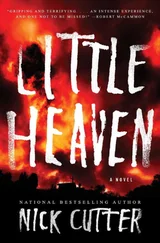The hole shimmers like water, is black as the water, but is not water.
We’d all be dead. Wouldn’t we?
Are we dead yet?
Monna—Monnaday?
It is inside me.
???
I dreamed of a boa constrictor eating a naked infant. The baby made no sound as it was consumed, although its eyes were round and wide with horror.
I haven’t left the lab in…?
Time scallops down here. Have I said that already? Days, weeks, months, minutes, seconds. Everything is liquid and ever shifting.
It’s safe in the lab. Nobody can see me. What’s happened to me.
The bee sting has multiplied, despite my never getting stung again. Instead of one inflamed anthill, dozens now festoon my flesh. Like giant, pulsating zits. I’ve squeezed them, too, hoping for a gout of yellow pus and with it, some relief. But the skin beneath each hill is hard, calcified, and it hurts immensely just to touch them.
My arms, legs, chest, stomach, buttocks—all covered with these inflamed hills. Fresh hills have appeared on my armpits, and recently my big toes. So far they have not appeared on the soles of my feet or my hands; if so, I fear I’ll be immobile. The merest brush with any obstruction brings forth blinding pain. My palms are unmarked as yet, too, meaning I can still write.
I haven’t seen anyone for some time. Every so often a staccato knocking sound will pierce the drone of the bees, but I don’t know if it’s Clayton or Hugo or something or someone else.
One knock for yes. Two for no.
I have no use of Clayton or Hugo anyway. To hell with them. I have my study.
I left the lab only once. I cleared the massing bees from the porthole window and saw the main lab was empty. I dashed out. Not a single bee fled my lab. Once out, I realized there was nothing I wanted. I wasn’t hungry; I haven’t wanted to eat for a long time. I needed no equipment.
My gaze fell upon the window. Darkness pressed against the glass, an insistent swirling. Shreds of ambrosia sucked over its surface like remoras.
The urge struck: find something heavy—a crowbar was the object that sprang to mind—and smash the window until it splintered and the sea rushed in.
I retreated to my lab. To my colony. It is monstrous. It has tripled, quadrupled in size. The bees carpet the walls and bench and ceiling—a humming, droning, fuzzy black-and-yellow carpet.
They do nothing but collect and build. I have provided the material: three sacks of refinery sugar, slit open with a scalpel.
The bees have abandoned their hives—they are building new structures.
A beehive is a marvel of mathematics. A home of hexagonal cells, the sides of each cell meeting at precisely 120 degrees. The hexagon is the perfect shape for storing the most honey while using the least beeswax. Every honeybee is born with the knowledge of how to build a honeycomb. They instinctively know that hexagons are the building blocks of their homes.
But these bees are building something else entirely.
Two hanging cathedrals. They descend inverted from the ceiling on opposite ends of the lab. Each is baffling to behold; the human eye can’t stare at them for too long, in the same way one cannot stare into the sun. Strange and frightening edifices. One almost resembles a stalactite, with bizarre corkscrews spiraling off at unnatural angles. The other dwindles in a cochlear swirl, with sharp jutting appendages that hold the articulation of robotic limbs.
The bees build their hives night and day. Honey is produced, but not harvested. The honey—dark and thick as motor oil—drips ceaselessly from each hive, forming sticky pools on the floor.
The queens lay somewhere within. I hear them sometimes: an angry, commanding buzz that rises above the general hum.
NIGHT
The anthills covering me have worsened. Broadened, heightened, connected together on my flesh. They have a uniform look, vaguely hexagonal. Like honeycombs.
“We are just skin.” My second wife said this in one of her fouler moods, when I had the bad timing to comment on her lovely figure. “Me and you and everyone, we’re all just skin and fat wrapped around bones.”
Yes, I’d told her, but I happen to fancy the way you’re wrapped.
My own wrapper is beginning to peel. HAH!
The pain is exquisite. I am half delirious with it. The instinct arose to show Clayton my condition and seek aid. But I like it too much in my lab, with my bees… and my wonderful hole.
The hives stretch ceiling to floor now. The bees have begun to build into the floor grating; satellite combs are appearing at the edges of the lab bench in the manner of toadstools ringing an elm tree.
The bees are changing, too. Larger, is the most obvious difference. Some are the size of hissing cockroaches. They are aggressive toward one another—bees are communal by nature, so this is strange. They seem obsessive but in a different way: instead of building a hive for the purposes of nurturing young and manufacturing honey, the hive itself is their sole ambition: building it, growing it.
They are not aggressive. I have not been stung again. They dance lightly up my arms and legs. It tickles. Sometimes I fall asleep and awake with them covering my face, tiptoeing over my closed eyes.
The air smells of caramelized sugar. A nice smell.
NIGHT
A massacre.
The bees of one hive attacked the other. I can’t imagine what provoked it. The air filled with mad buzz, the sound of a rusted band saw. They fought in the air and on the ground. It was the most vicious thing I’d ever seen.
One hive, the cochlear one, has been fading of late. Its honeycomb took on a grayish hue. Its honey was a clotted, sludgy gray. Its drones, while large, were spiritless in their fight against the drones from the other hive.
I tried to stop them—how in God’s name do you stop a bee-fight? I waved my arms (my swollen, itching, bloody arms) frantically, yelling, “Stop!”
Yes, I yelled at bees. It is to laugh…
They didn’t attack me, but they didn’t stop going after one another. They danced gently on my arms as they battled, their stingers jabbing crazily.
It was over quickly. The floor was covered with the dead. The victorious bees descended upon the cochlear hive, ripping at the rotting honeycomb. They attacked the nesting queen. I never got a good look at her—her body was covered in drones, layer upon layer—but she was clearly huge. She toppled from her throne and hit the lab bench with a meaty smack. The drones stung and ripped at her—some have developed rudimentary mandibles. When they cleared off, buzzing sluggishly back to their labors, the bench was empty save a blot of very thick, red royal jelly. The color of blood.
Their industry continues unabated. They have grafted their hive to the bones of the cochlear one. It is incredibly large—I have to crawl on my belly to reach the other side of the lab (where my hole is), my head mere inches from the dripping comb and that unearthly buzz.
The new hive is profoundly disturbing to behold. It beggars mathematics. The eye revolts.
I’m sitting beside my fantastic hole now. It is larger. I could probably squeeze a volleyball through it, into…
????????????
The bees are entranced by the hole. They hover nearby, crawling around its circumference in a narcotic daze.
It makes such lovely noises, the hole. Those resonant knocks. And odd muttersome sounds, musically sweet, like voices from another room. If I listen closely enough, perhaps I can hear what they’re saying.
Am I insane?
Does a sane man ask himself that question?
Ha! Ha! Ha! Hey!
· · ·
They came out of me. They were born inside of me, fostered in me, and then they exited me.
Читать дальше












